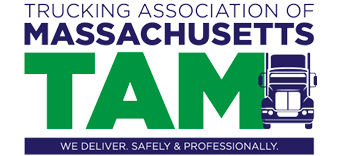In support of legislation to meet the workforce needs of the trucking industry
The following communication was sent today to the House Chair, Senate Vice Chair, and members of the Joint Committee on Transportation expressing TAMs strong support for for House Bill 3522, An Act Relative to the Training of Tomorrow’s Trucking Industry Workforce. The letter is also available as a PDF to be printed.
Dear Chair Straus, Vice Chair Keenan and Members of the Committee:
On behalf of the over 250 member companies of the Trucking Association of Massachusetts (TAM), I am writing to urge your strong support for House Bill 3522, An Act Relative to the Training of Tomorrow’s Trucking Industry Workforce. This legislation, which received a favorable report from a different committee last session, will encourage the training of students and transitioning of career professionals to meet the growing workforce needs of the trucking industry.
In Massachusetts, the trucking industry is a key driver of economic growth: it accounts for about 1 out every of 12 jobs in the Commonwealth, or approximately 300,000 jobs in total as of 2017. There are many lucrative career options within the trucking industry. For example, according to the United States Bureau of Labor and Statistics, heavy and tractor-trailer truck drivers make upwards of $60,000 per year. Many trucking industry jobs don’t require a college degree, unlike certain jobs in today’s market, making trucking an attractive profession for those looking to earn a steady income without first spending a lot of their own money and time to attend four or more years of school.
Despite the potential career options that the trucking industry offers, the industry is facing a workforce shortage. According to the American Trucking Association, the industry will need to hire almost 900,000 new drivers and other key positions nationally over the coming decade, with most of the demand resulting from retiring drivers and industry growth. At the same time, interest in the profession is waning, making it difficult for the industry to fill these vital positions. By 2026, the ATA forecasts that the industry could be facing a shortage of almost 175,000 drivers and additional trucking industry workforce. When you consider that 93% of all goods transported into and within the Commonwealth are carried on a truck, it becomes clear that this shortage is a problem not just for the trucking industry, but the Commonwealth as a whole. Indeed, the trucking industry workforce shortage could cost Massachusetts to miss out on significant tax revenues: a study by the Dukakis Center for Urban Research and Policy at Northeastern University recently estimated that each local trucking employee generates about $3,396 per year in state and local payroll, income and property taxes.
Accordingly, House Bill 3522 would create a mechanism for a wide variety of organizations and employers to train and hire individuals for positions within the trucking industry to address this workforce shortage. By establishing a Trucking Industry Workforce Training Fund, the bill would provide a source of funding by which employers and employer associations, local workforce investment boards, institutions of higher education, vocational schools, and other organizations could finance programs to support both the training of the next generation of the trucking workforce and the retention and upgrading of the existing trucking workforce.
In order to finance the Trucking Industry Workforce Training Fund, the bill would create a $5 surcharge on all applications for licensure or renewal of a commercial driver’s license. This mechanism ensures that no financial burden would fall on most residents of the Commonwealth. Organizations across the Commonwealth could then apply for grants, financed by the Trucking Industry Workforce Training Fund, to operate training programs, which will follow guidelines established by the Massachusetts Board of Higher Education. This funding will be crucial in addressing the trucking industry’s workforce shortage, and, ultimately, enable individuals to obtain good careers in a vibrant and growing industry.
I appreciate your consideration of House Bill 3522, An Act Relative to Training Tomorrow’s Trucking Industry Workforce, and respectfully request that the Committee release the bill with a favorable report. Please do not hesitate to contact me with any questions or concerns. I look forward to working with you on this important matter.
Sincerely,
Kevin R Weeks
Executive Director



